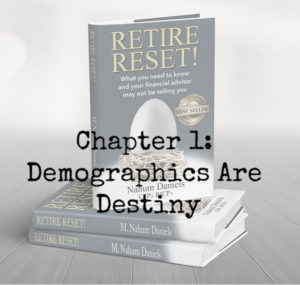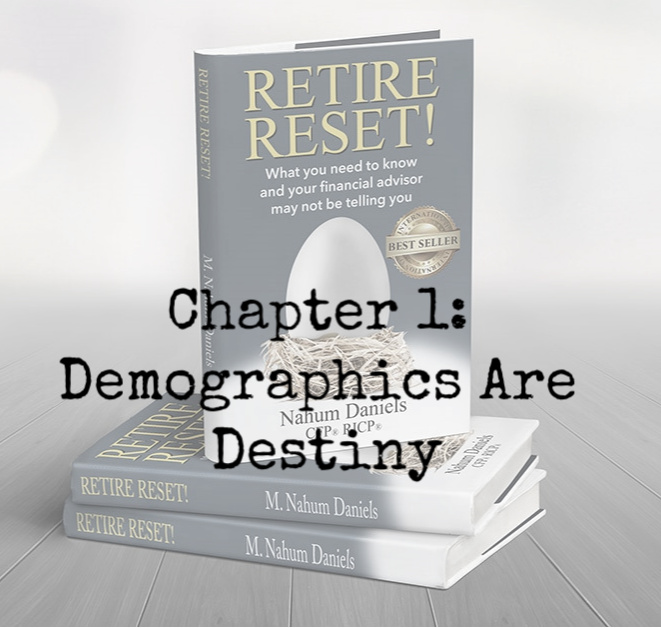 By Nahum Daniels, CFP®, RICP®
By Nahum Daniels, CFP®, RICP®
If you’ve been wondering about the book I wrote, RETIRE RESET!, we are publishing some excerpts every month right here on our blog so that you can learn more. Along the way, you will learn why our firm, Integrated Retirement Advisors, was founded: we’re on a mission to help people with retirement! Here is an excerpt from Chapter 1.
Chapter 1: DEMOGRAPHICS ARE DESTINY
The Transcendent Issue of the 21st Century
When closely examined, the retirement challenges we face as a society are actually much more complex than they first appear. The mainstream media skate along the surface, pointing to long-lived baby boomers with inadequate personal savings looking to a fragile if not insolvent social security system unable to make up the difference. All true. Upon deeper analysis, though, it turns out there’s even more to the problem, including slowing population growth, shrinking consumer demand, exploding debt, inflated financial bubbles in the stock and bond markets, deflationary wage and employment pressures and over-spent governments at odds with their own citizens. Without understanding the surprising connectivity of these global forces it’s hard to appreciate the magnitude of the tsunami they may be forming.
The headwinds we face are driven by a sea change in domestic and global “demographics,” or the ratio of different age groups in society. With fertility rates falling and longevity rising, the industrialized world is entering an unprecedented era of hyper-aging. As a result of modern medicine and improved hygiene, global life expectancy has improved dramatically over the last 50 years and Americans are living longer than ever before. According to data from the Centers for Disease Control (CDC), average US life expectancy has rocketed from 47 to 79 over the past hundred years. What’s more, our fastest growing age groups are the octogenarians and nonagenarians. In its latest report “The Older Population in the United States: 2010-2050” the Census Bureau predicts that over the next three decades the number of people in the U.S. over the age of 65 is expected to double while those 85 and up (the “oldest old”) will triple. This may be good news for baby boomers who stay vital, but it’s bad news for the survivability of the social safety net.
Of course, living a long, active, self-reliant life into our eighties or nineties can be a blessing, a period of extended contribution and enriched meaning. Two of my most remarkable clients definitely feel that way. They make up a husband and wife team of medical doctors who treat patients, design and oversee innovative research, write books and lead international organizations. He just celebrated his 92nd birthday and she her 90th. They still work full-time and see no reason to pack it in, believing that their work is simply not done.
On the other hand, a long life characterized by infirmity, incapacity, and scarcity after a career of unsatisfying labor can feel like a curse. Whether a blessing or a curse, one thing remains true: longevity costs money.
Chapter 1 Takeaways
1. In an unfortunate turn for baby boomers, the US economy is struggling to recover from of one of the worst downturns in generations.
2. With fertility rates falling and longevity rising, the industrialized world is entering an unprecedented era of hyper-aging aggravated by population decline.
3. Adverse demographics are believed to be at the heart of what some prominent economists refer to as “secular stagnation,” a long-term slowdown in economic activity, productivity and innovation that neither fiscal (tax) nor monetary (Fed) policies alone may be able to reverse.
4. In fact, tax increases and government benefit decreases may be forthcoming while life expectancy improvements result in a retirement that can last for 30 years or more.
5. Consequently, our personal nest eggs have taken on a level of importance they haven’t previously had, and how you convert yours into a personal pension is critical to your long-term retirement success.
###
If you would like to discuss your personal retirement situation, please don’t hesitate to call our firm, Integrated Retirement Advisors, at (203) 322-9122.
If you would like to read RETIRE RESET!, it is available on Amazon at this link: https://amzn.to/2FtIxuM

